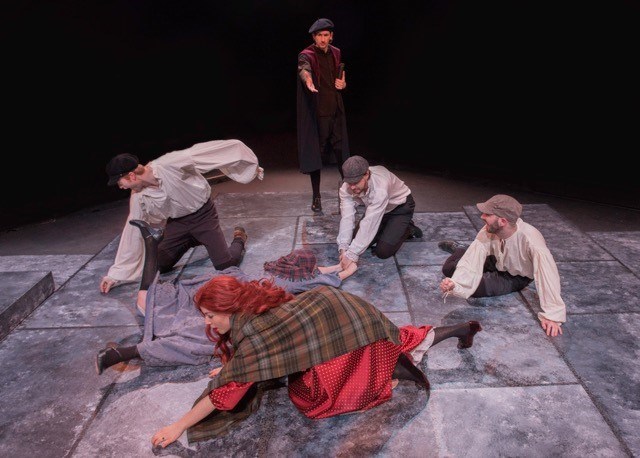“Once upon a time there weretwa queens on the wan green island, and the wan green island was split intae twa kingdoms.” Thus Scottish playwright Liz Lochhead sets the stage for the tale of two queens: Elizabeth I (unmarried, childless, protestant and Queen of England) and Mary Stuart (who will be thrice married and bear two living sons, Catholic, Queen of Scotland). Mary and Elizabeth are cousins, tracing their lineage back to Henry VIII.
The timeframe of Mary Queen of Scots Got Her Head Chopped Off ismid- to late-16th century, but this is not a play about dates, wars and successions. This is a play about women in power, how they manipulate and are manipulated, how they remain in power and how they lose their heads — romantically as well as actually. Elizabeth is coolly pragmatic; Mary, hotly passionate. Both are beleaguered by men eager to unseat them.
In the middle is John Knox, leader of the Protestant Reformation in Scotland. In Lochhead’s play, he is viewed as fanatically opposed to Catholicism, sexually repressed and viciously misogynistic.
Friedrich von Schiller in 1800 covered some of the same terrain in Mary Stuart, but in contrast to Schiller’s play — an elegant verse play written in German — is Lochhead’s irreverent, affectionate play, written in 1987 in Old Scots, the language spoken in Scotland during that historical period. Initially, it sounds like a foreign language, but it soon becomes quite natural, even fun to untangle. And the tone of this play, as opposed to Schiller’s, is rougher, less formal, gutsy and visceral — even, at times, sexy as partners tumble seemingly unencumbered by yards of gowns and petticoats.
Arguably the most interesting aspect of Mary Queen of Scots Got Her Head Chopped Off is Lochhead’s use of a character called the Corbie (from la corbeille, “ł¦°ů´Ç·É”) as the narrator/chorus/ringmaster throughout. Her commentary is sardonic and dark (Scotland she describes as “a peatbog... a cauldron o lye, a saltpan or a coal mine”). Wearing a tiny top hat with rooster-feather plumes, a black frock coat trimmed at the wrists with glossy feathers, and holding a whip, Bethany Stanley skulks around the periphery of the performance area. Sometimes crouching, sometimes pacing, the Corbie directs her narration to the audience, frequently revealing her impatience or weariness with the characters as they bungle their way through history. Stanley is outstanding: slightly menacing, slightly mocking.
Erin Morgan is red-haired, headstrong Mary, undone by love. Morgan brings a lusty love of life to Mary that’s compelling but suggests a lack of Mary’s political savvy that is her downfall.
Geneva Perkins’ Elizabeth, the Virgin Queen, is regal although given to petty jealousy — including envy of Mary’s children. Lochhead shows where her sympathy lies as Elizabeth, eager to be rid of Mary but reluctant to give the order, pointedly tells her courtiers, “Trick me,” and they do.
Alexander Lowe is, appropriately, a weak-willed Darnley, a great disappointment to Mary while Xander Willams is a handsome, womanizing Bothwell. Kurtis Maguire’s John Knox is repellant — as the playwright obviously wished him to be — and Owen A. Kenney portrays Davy Rizzio, personal secretary to Mary.
Catherine E. Carr designed handsome costumes; wandering troubadour Genevieve Mackay provides delightful fiddle music including some lovely old Scottish tunes; and lighting design is by Chengyan Boon.
Produced by Vital Spark Theatre Company and directed by the company’s artistic director Joan Bryans, Mary Queen of Scots is an earthy, interesting retake on what is generally a story told from an English perspective. It’s also a commentary on the challenges facing women in high places. Nowhere more than in the realms of power is it so true it’s a man’s world. Ring any bells?
Mary Queen of Scots Got Her Head Chopped Off is at Jericho Arts Centre until March 11. For tickets, call 604-224-8007 or go to .
***
After almost 30 years covering the Â鶹´«Ă˝Ół»theatre scene, I will no longer be reviewing for the Â鶹´«Ă˝Ół»Courier due to recent cutbacks. It has truly been a pleasure working with various entertainment editors over the years, including — most recently — Michael Kissinger (now City Editor). Meeting Courier readers at the theatre, online and even in coffee bars has made me feel a part of a vibrant local arts community; I have always enjoyed your comments, corrections and criticism and will continue reviewing online at .



